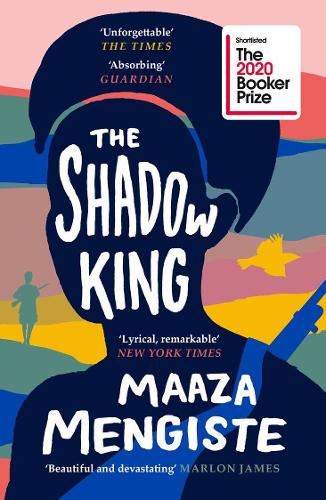The Shadow King
Maaza Mengiste
(Canongate, 2020); pbk £8.99
Maaza Mengiste’s second novel, The Shadow King, was shortlisted for the Booker prize in 2020 and bears all the hallmarks of the accolade. ‘Beautiful and devastating’ is Marlon James’ endorsement. What he means, we can assume, is that the writing is beautiful but its content devastating; the prose is vibrantly lyrical but the subject matter roams the darkest corners of conflict, something hard to reconcile with the word beautiful. The Shadow King simmers in the heat of 1930’s Ethiopia as Mussolini’s army invades. Hirut, servant of Kidane, an officer in the Ethiopian resistance, is swept up in this brutal moment in history and must come to terms with her own place in this story.
But as in every war, Hirut’s is not the only perspective – we follow Ettore, a Jewish-Italian war photographer and the fascist general he serves under. Even the Emperor Haile Sellasie makes intermittent appearances as he retreats. Then there is the collective narrative voice of the Chorus, inspired by the device used in Greek tragedy which brings a mythic birds-eye perspective. An especially mournful interlude finds the Chorus imagining a reversal of the tragedies unfolding in the hands of Kidane: ‘Remove the admonishments to stand tall and stay strong. Eliminate the birthright, the privilege of nobility, the weight of ancestors and blood.’
Kidane is not the only character contorted by his father’s legacy; even the maniacal fascist general is haunted by his father’s disapproving voice, while others glean wisdom and support from their ancestors. There are no simple heroes or villains; everyone carries an inheritance that mixes darkness with light and the blazing sun casts this tonal metaphor all the more vividly: ‘The young man is at the door, leaning outside, unaware that a blade of sunlight cuts across the glowing bloom of his curly hair.’
Ettore’s camera lens is an extraordinary literary device, deepening the theme of light and shadow and drawing us into the flinching complicity of witness. Readers who have encountered war only through images and words will find this perspective brings them uncomfortably close to the subject:
This is what Ettore sees when he looks at the girl: That there is a dying-away that happens in a breathing body… [he] raises the camera and finds relief. Through the viewfinder, she is just a small, lonely figure.
Ettore also grapples with the task of crafting images from atrocity, finding himself absorbed in the creation of a series of photographs of a young solider hanging from a tree: ‘As he continues, he shifts from discomfort and reluctance to a quiet and certain confidence: these are some of the best photographs he’s ever made.’ It is a scene the remainder of the novel seems to descend from.
As with the best historical fiction, The Shadow King heartbreakingly foreshadows present issues. As I write, it is clear that the current conflict in Tigray – a region of Ethiopia where much of The Shadow King is set – will not be the short-term military intervention its instigators had promised. There are other parallels too; a particularly poignant refrain sees characters invoke the names of their dead as an act of resistance, reminding us of the roots of the #SayHerName movement.
The Shadow King joins the ranks of literature capable of eliciting a desire to un-read, recalling such harrowing novels as The Bridge on the Drina by Nobel Prize winner Ivo Andrić or Charlotte Wood’s Stella Prize winning The Natural Way of Things. Yet always by the last page, an understanding is reached; the unflinching eye is essential in gathering such depth of meaning capable of collapsing moments into history and history into moments.
Beauty is one word for an art that scrutinises everything – sunlight and bloodshed, cruelty and joy – and makes the full spectrum sing with minutiae and myth. Yes, this book is worthy of the word, but to stop there would be to fall well short of its power.
Ellie Julings


Leave a Reply